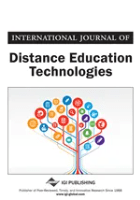
International Journal of Distance Education Technologies
Scope & Guideline
Pioneering Insights at the Intersection of Education and Technology
Introduction
Aims and Scopes
- Distance Learning Technologies:
The journal emphasizes the development and evaluation of technologies that facilitate distance education, including online learning platforms and tools that support interactive and engaging learning environments. - Pedagogical Innovations:
There is a strong focus on innovative teaching methodologies that leverage technology to improve learning outcomes, including blended learning, immersive learning, and the use of virtual reality in educational settings. - Teacher-Student Interaction:
Research on how technology influences teacher-student interactions is a core area, with studies exploring the dynamics of online engagement and effectiveness in various educational contexts. - Assessment and Evaluation:
The journal covers methodologies for assessing the effectiveness of distance learning programs, including the use of data analytics and machine learning to enhance teaching practices and student performance. - Cultural and Contextual Adaptations:
It addresses the adaptation of distance education practices to different cultural and contextual settings, particularly in developing countries, ensuring the relevance and applicability of educational technologies across diverse populations.
Trending and Emerging
- Metaverse and Immersive Learning:
There is a growing interest in the application of the metaverse and immersive learning environments, showcasing how virtual and augmented realities can create engaging educational experiences. - Data Analytics in Education:
The use of data analytics and machine learning to assess and enhance learning outcomes is trending, with studies focusing on predictive modeling and personalized learning pathways. - Blended Learning Models:
Research into blended learning approaches, particularly those that effectively combine online and offline elements, is gaining traction, reflecting the need for flexible educational models. - Teacher Professional Development in Online Contexts:
Emerging themes include the professional development of educators for online teaching, particularly how to navigate and integrate technology effectively into their practices. - Student Engagement and Interaction:
There is an increasing emphasis on understanding and improving student engagement in online learning environments, exploring factors that enhance interaction and collaboration among learners.
Declining or Waning
- Traditional Learning Theories:
There has been a noticeable decrease in research focused solely on traditional learning theories without integration with technology, suggesting a shift towards more contemporary approaches that incorporate digital tools. - General E-Learning Experiences Without Specificity:
Papers that discuss e-learning experiences in a broad manner, without specific technological frameworks or pedagogical innovations, have become less frequent, indicating a preference for detailed, technology-driven studies. - Impact of COVID-19 as a Standalone Topic:
As the immediate impacts of the COVID-19 pandemic on education are becoming less of a focal point, research that solely addresses the pandemic's effects without broader implications for distance education is less prevalent. - Focus on Non-Interactive Technologies:
Research centered on non-interactive or passive learning technologies has decreased, reflecting a trend towards more interactive and participatory educational experiences that engage students actively.
Similar Journals

Revista EDaPECI-Educacao a Distancia e Praticas Educativas Comunicacionais e Interculturais
Exploring New Frontiers in Distance LearningRevista EDaPECI-Educacao a Distancia e Praticas Educativas Comunicacionais e Interculturais, published by the Universidade Federal de Sergipe, is a distinguished open-access journal focusing on innovative practices in distance education and intercultural communication within educational contexts. Since its inception in 2009, this journal has aimed to provide a platform for researchers, educators, and practitioners to share insightful studies and methodologies that enhance teaching and learning processes in diverse educational settings. With an ISSN of 2176-171X, it contributes to the growing discourse on the integration of technology in education and aims to bridge gaps in intercultural understanding. The journal's commitment to open access ensures that knowledge is accessible to all, fostering collaboration and advancement in educational practices globally. As the field of distance education continues to evolve, Revista EDaPECI stands out as an essential resource for those seeking to explore and contribute to this dynamic and impactful area of study.

E-Learning and Digital Media
Redefining learning experiences through digital media.E-Learning and Digital Media, published by SAGE Publications Inc, is a premier academic journal dedicated to the innovative intersection of digital technologies and education. With a strong commitment to advancing research in the fields of education and computer science, this journal has established itself as a vital resource for researchers, professionals, and students alike. As of 2023, it proudly holds a Q2 ranking in both Computer Science Applications and Education, reflecting its impact and reach within the academic community. The journal encompasses a wide range of topics exploring the effectiveness and applications of e-learning technologies, pedagogical strategies, and digital media in educational settings. Since its inception in 2009, E-Learning and Digital Media has continuously contributed to the understanding and development of digital education, ensuring relevancy in an ever-evolving landscape. With an open access model intended to foster accessibility and dissemination of knowledge, this journal invites submissions that push the boundaries of traditional education through cutting-edge research and practice.

RIED-Revista Iberoamericana de Educacion a Distancia
Bridging Gaps in Education Through Open AccessRIED-Revista Iberoamericana de Educacion a Distancia is a premier academic journal dedicated to the dynamic field of distance education, published by the ASOCIACION IBEROAMERICANA EDUCACION SUPERIOR & DISTANCIA - AIESAD. Established in 1998 as an Open Access journal, it provides a valuable platform for researchers, educators, and practitioners to disseminate and access cutting-edge research and innovative practices in distance learning. With its ISSN 1138-2783 and E-ISSN 1390-3306, RIED ranks within the top 2nd Quartile (Q2) in both Computer Science Applications and Education as of 2023, showcasing its significant impact and relevance in academia. Positioned in Spain, the journal not only serves the Ibero-American educational community but also contributes to the global discourse on online education methodologies and technologies. With an impressive Scopus ranking in the 92nd percentile for Social Sciences (Education) and 77th percentile for Computer Science (Computer Science Applications), RIED is essential for those seeking to advance their understanding and expertise in the realm of distance education.
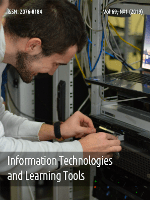
Information Technologies and Learning Tools
Bridging the Gap Between Technology and Education.Information Technologies and Learning Tools is a pioneering scholarly journal dedicated to the exploration and dissemination of knowledge within the rapidly evolving field of educational technology. Published by the NATIONAL ACADEMY OF EDUCATIONAL SCIENCES OF UKRAINE, INSTITUTE OF DIGITALIZATION EDUCATION, this journal has maintained its Open Access policy since 2006, ensuring that groundbreaking research is readily available to educators, researchers, and practitioners worldwide. With the ISSN 2076-8184, the journal serves as a critical platform for innovative studies focusing on the integration of information technologies into educational practices, seeking to bridge gaps between digital tools and effective learning methodologies. Despite the absence of specific rankings, its commitment to advancing educational theories and applications positions it as an essential resource for professionals and students striving to enhance learning experiences through technology. As the educational landscape continues to transform, Information Technologies and Learning Tools stands at the forefront, fostering collaboration and knowledge sharing across diverse academic communities.
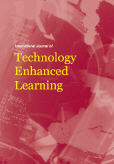
International Journal of Technology Enhanced Learning
Transforming Learning Experiences with Cutting-Edge TechnologyInternational Journal of Technology Enhanced Learning, published by INDERSCIENCE ENTERPRISES LTD, is a premier scholarly journal that comprehensively explores the intersection of technology and education, fostering innovative approaches to enhance learning processes. Established in 2008 and continuing through 2024, the journal is pivotal for researchers, educators, and technology professionals aiming to disseminate and engage with cutting-edge developments in technology-enhanced learning environments. With an admirable ranking in Scopus—placing in the 72nd percentile of Education and 49th in Computer Science Applications—the journal reflects a robust influence in the fields of Computer Science Applications and Education, as evidenced by its Q2 and Q3 quartile rankings. The journal not only provides a platform for empirical research and theoretical discourse but also emphasizes practical implementations in e-learning. Although it does not offer open access, its curated collection of articles serves as a vital resource for scholars and practitioners who are dedicated to advancing the nexus of technology and education.

Qwerty
Exploring the Nexus of Communication and CultureQwerty, published by PROGEDIT in Italy, serves as a vital interdisciplinary platform that explores the intersections of communication, cultural studies, education, and human-computer interaction. With its ISSN 1828-7344 and E-ISSN 2240-2950, this journal has quickly established itself since its inception in 2017, offering significant insights into the evolving dynamics of these fields. Notably, it boasts impressive Scopus rankings, with a Q2 quartile placement in Communication and a Q1 ranking in Cultural Studies, reflecting its strong impact and reach within academia. Engaging scholars and practitioners alike, Qwerty challenges conventional boundaries by fostering a dialogue that merges traditional educational frameworks with innovative technological perspectives. Although it follows a traditional access model, its contributions are pivotal for researchers, students, and professionals seeking to enhance their understanding of contemporary issues in digital communication and cultural phenomena. As it approaches its convergence period in 2024, Qwerty is poised to further its mission of cultivating rich scholarly discourse across multiple disciplines.

International Journal of Education and Information Technologies
Unlocking Potential through Research and Innovation in EducationWelcome to the International Journal of Education and Information Technologies, a leading academic platform published by NORTH ATLANTIC UNIV UNION-NAUN. With an emphasis on the integration of education and information technology, this journal aims to foster innovative research and discussions that enhance pedagogical practices and technological advancements in educational contexts. Although currently an open access journal, it provides unrestricted access to emerging studies that are crucial for educators, researchers, and professionals aiming to stay at the forefront of education technology. While specific metrics such as H-index and Scopus ranks are yet to be defined, its ISSN 2074-1316 signifies its credibility and commitment to quality scholarship. This journal serves as a vital resource for those passionate about bridging the gap between technology and education, encouraging impactful research that shapes the future of learning environments.
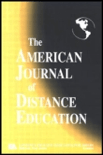
American Journal of Distance Education
Connecting scholars and educators in the digital age.The American Journal of Distance Education, published by ROUTLEDGE JOURNALS, TAYLOR & FRANCIS LTD, stands as a premier publication in the field of online learning and distance education. With an ISSN of 0892-3647 and an E-ISSN of 1538-9286, this journal has been at the forefront of research since its inception in 1987, delivering insights into emerging trends and methodologies in educational technology. Nestled in the United States, it enjoys a commendable reputation with an impact factor that reflects its significance, as indicated by its category quartiles: Q2 in Computer Science Applications and Q1 in Education, along with impressive Scopus rankings placing it in the top percentiles of its categories. The journal's mission is to foster scholarly discourse and present empirical research that addresses the challenges and innovations in distance learning environments. Researchers, educators, and students alike will find valuable information that contributes to the advancement of this rapidly evolving field.
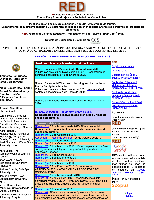
RED-Revista de Educacion a Distancia
Fostering Innovation in Distance Education MethodologiesRED-Revista de Educacion a Distancia is a premier open-access journal published by UNIV MURCIA in Spain, dedicated to advancing research in the fields of education and computer science applications. Since its inception in 2001, the journal has served as an essential platform for disseminating innovative research and practical applications of distance education methodologies. With an impressive impact factor and ranked in Q2 across both Computer Science Applications and Education categories as of 2023, RED is recognized for its significant contribution to the scholarly community, particularly within the Social Sciences and Engineering domains. Researchers and professionals are invited to explore cutting-edge studies that underpin pedagogical effectiveness and technological integration in educational settings. Based at the Edificio Pleiades Campus de Espinardo in Murcia, RED continues to foster an engaging dialogue among academics, providing insights that propel the field forward.

Journal of Information Technology Education-Research
Fostering Scholarly Dialogue in IT EducationThe Journal of Information Technology Education-Research, published by the Informing Science Institute, stands as a pivotal resource in the field of educational technology and computer science. With an ISSN of 1547-9714 and an impressive E-ISSN of 1539-3585, this journal aims to disseminate high-quality research and innovative practices that enhance the integration of information technology in educational contexts. It has achieved commendable rankings, notably Q2 in Computer Science (miscellaneous), Q1 in Education, and Q2 in E-learning for the year 2023, reflecting its significance and impact in these domains. Within the Scopus metrics, it ranks #178 out of 1543 in Social Sciences Education and #50 out of 232 in General Computer Science, positioning it in the top percentiles of its fields. This journal is dedicated to fostering scholarly discourse and providing a platform for educators, researchers, and professionals to share their findings and insights, contributing to the advancement of knowledge and practices in information technology education. The journal covers research from 2011 to 2024, ensuring a comprehensive collection of contemporary studies that engage with current trends and challenges in IT education. For scholars seeking an open-access platform to disseminate their work, this journal presents an invaluable option to engage with a broad academic audience.